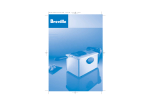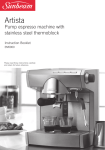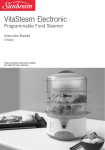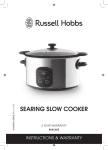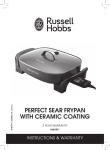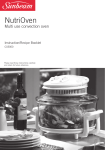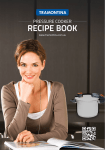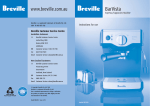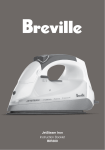Download BREVILLE 800ES Instruction Manual
Transcript
ESPRESSO MACHINE Breville Customer Service Centre TM Australian Customers New Zealand Customers Mail: Breville Customer Service Centre Locked Bag 2000 Botany NSW 2019 AUSTRALIA Mail: Phone: Customer Service: 1300 139 798 Phone: Customer Service: 09 271 3980 Fax (02) 9384 9601 Fax 0800 288 513 Email Customer Service [email protected] Email Customer Service [email protected] Breville Customer Service Centre Private Bag 94411 Greenmount AUCKLAND NEW ZEALAND w w w. b re v i l l e . c o m . a u Breville is a registered trademark of Breville Pty Ltd. A.B.N. 98 000 092 928 Head Office Building 2, Port Air Industrial Estate, 1A Hale Street, Botany, NSW, 2019 Australia Tel 1300 139 798 20 Mono Place, Ellerslie, Auckland, New Zealand Private Bag 94411, Greenmount, Auckland Tel 09 271 3980 Model 800ES Issue 1/04 Due to continued product improvement, the products illustrated/photographed in this brochure may vary slightly from the actual product. TM CONTENTS ESPRESSO MACHINE 4 Congratulations 5 About your espresso machine 6 Breville recommends safety first 8 Know your Breville 800 Class™ Espresso Machine 10 Assembling your Breville 800 Class™ Espresso Machine 12 Operating your Breville 800 Class™ Espresso Machine 17 How to froth milk for a cappuccino or Latté 20 Using the hot water function 21 Coffee making tips 24 Care and cleaning 28 Trouble shooting guide 32 Coffees to try 36 Recipes 3 Congratulations on the purchase of your new Breville 800 Class™ Espresso Machine From its heavy-duty housing and professional-grade functionality through to its superior and easy operation, Breville’s 800 Espresso Machine was designed for the true coffee connoisseur. In developing this booklet, our goal was to provide you with the fundamental point from which you can start to discover the incredible versatility of your 800ES; the Espresso Machine that delivers simply superior coffee. Our hope is that with each page, you gain increasing pleasure from your 800ES and its ability to help you create a wonderfully broad range of flavour-rich coffees. We would just like to say thank you and… enjoy. 5 BREVILLE RECOMMENDS SAFETY FIRST We at Breville are very safety conscious. We design and manufacture consumer products with the safety of you, our valued customer foremost in mind. In addition we ask that you exercise a degree of care when using any electrical appliance and adhere to the following precautions: IMPORTANT SAFEGUARDS FOR YOUR 800 Class™ ESPRESSO MACHINE AND FOR ALL ELECTRICAL APPLIANCES • Carefully read all instructions before operating and save for future reference. • Do not leave the 800 Class Espresso Machine unattended when in use. • Do not place the 800 Class Espresso Machine near the edge of a bench or table during operation. Ensure the surface is level, clean and free of water. • Do not touch hot surfaces. Allow the 800 Class Espresso Machine to cool down before moving or cleaning any parts. • Remove any promotional stickers before using the 800 Class Espresso Machine for the first time. • Do not place the 800 Class Espresso Machine on or near a hot gas or electric burner, or where it could touch a heated oven. • Always make sure the 800 Class Espresso Machine is properly assembled before connecting to power outlet and operating. • Always switch the 800 Class Espresso Machine off, then switch off at the power outlet and then unplug if appliance is to be left unattended, if not in use, before cleaning, before attempting to move the appliance, disassembling, assembling and when storing the appliance. • Use only cold water in the water tank. Do not use any other liquid. • Keep the appliance and accessories clean. Follow the cleaning instructions provided in this book. • Never use the 800 Class Espresso Machine without water in the water tank. • Unwind the cord before use. • Ensure the filter holder is firmly inserted and secured into the brewing head before using the machine. • Never remove the filter holder during the brewing operation as the machine is under pressure. 6 • Do not place anything, other than cups for warming, on top of the 800 Class Espresso Machine. BREVILLE RECOMMENDS SAFETY FIRST • To protect against electric shock, do not immerse cord, plug or appliance in water or any other liquid. • Do not let the cord hang over the edge of a table or counter, touch hot surfaces, or become knotted. • This appliance is not intended for use by young children or infirm persons without supervision. • Young children should be supervised to ensure that they do not play with the appliance. • It is recommended to inspect the appliance regularly. Do not use the appliance if power supply cord, plug or appliance becomes damaged in anyway. Return the entire appliance to the nearest authorised Breville service centre for examination and/or repair. • Any maintenance other than cleaning should be performed at an authorised Breville Service Centre. • This appliance is for household use only. Do not use this appliance for anything other than its intended use. Do not use in moving vehicles or boats. Do not use outdoors. • The installation of a residual current device (safety switch) is recommended to provide additional safety protection when using electrical appliances. It is advisable that a safety switch with a rated residual operating current not exceeding 30mA be installed in the electrical circuit supplying the appliance. See your electrician for professional advice. KNOW YOUR BREVILLE 800 CLASS™ ESPRESSO MACHINE Extra large cup warming plate 15 bar pump Italian designed and made Hot water button press while the Selector Control is turned to ‘Steam’ to utilise hot water function Steam button will illuminate to indicate that the steam function is selected Power On/Off button surround illuminates when the button is pressed Thermoblock heating system ensures coffee is extracted at the correct temperature ‘Heating’ light illuminates in red Selector Control – for Espresso Standby (•) and Steam , Solid chromed brass filter holder Brew Head for easy fitment of the filter holder Advanced dual wall crema system for the perfect crema Swivel steam wand with stainless steel frothing attachment – easily adjusted to perfect position for frothing milk Removable 2.2 litre water tank can be filled from the front or the rear of the machine External viewing back-lit water window Extra large cup height for coffee mugs Removable 1 litre drip tray and grid Cord storage 8 KNOW YOUR BREVILLE 800 CLASS ESPRESSO MACHINE 1 and 2 cup dual wall stainless steel filters (not shown) Drip tray full indicator Pre-brew function: for optimum coffee extraction pressure Auto purge function: for optimum coffee extraction temperature Storage tray – located behind the drip tray for storage of accessories Accessories (not shown in picture) Custom designed stainless steel frothing jug Custom designed measuring/tamping spoon Custom designed cleaning tool KNOW YOUR BREVILLE 800 CLASS ESPRESSO MACHINE 9 ASSEMBLING YOUR BREVILLE 800 CLASS™ ESPRESSO MACHINE Your 800 Class Espresso Machine will have the Drip Tray, Storage Tray and Water Tank in place when you unpack it from the box. Before first use: It is recommended to complete a water brewing operation without ground coffee before brewing your first espresso coffee to ensure that all internal piping has been preheated (follow Steps 1 and 4 in Operating your Breville 800 Class Espresso Machine – Pages 13 and 15). The Storage Tray is located at the base of the machine against the back wall. The Drip Tray is located in the base of the machine in front of the Storage Tray. The Water Tank is located over the Drip Tray, in the front opening of the machine. The 2 stainless steel Filters, Cleaning Tool, Measuring/tamping Spoon, Filter Holder and Frothing Jug will all be packed inside the foam packaging. Ensure you have located all parts and accessories before throwing out the packaging. The Storage Tray is a convenient location to store the Cleaning Tool, stainless steel filters and Measuring/tamping Spoon when not in use, so they are not misplaced. Remove the Drip Tray, Water Tank and Storage Tray and wash all parts and accessories in warm, soapy water using a non-abrasive washing liquid. Rinse and dry thoroughly. NOTE: Do not clean any of the parts or accessories in the dishwasher 10 ASSEMBLING YOUR BREVILLE 800 CLASS ESPRESSO MACHINE TO REASSEMBLE: STEP 1 Insert the Storage Tray into the base of the machine and slide in towards the back wall. This is a convenient location to store the Cleaning Tool, stainless steel Filters and Measuring/tamping Spoon when not in use, so they are not misplaced. STEP 2 Place the Drip Tray full Indicator into the the Drip Tray and then place the stainless steel grid on top. Slide the Drip Tray into the base of the machine in front of the Storage Tray. STEP 3 Slide the Water Tank over the Drip Tray and into the front opening of the machine and into position above the Storage Tray. Ensure the Water Tank aligns flush with the sides of the machine. ASSEMBLING YOUR BREVILLE 800 CLASS ESPRESSO MACHINE 11 OPERATING YOUR BREVILLE 800 CLASS™ ESPRESSO MACHINE • Remove the Filter Holder if locked into the Brew Head and move the Steam Wand to the side of the machine. • Remove the Water Tank by pulling with the handle insert in the front of the Espresso Machine. • When the Water Tank is removed, a black tube slides and extends out from the Water Tank storage area. Do not touch or try to remove this tube, it will automatically slide back into position when the Water Tank is reinserted. • Fill the Water Tank with cold water to the maximum mark on the Water Window and slide the Water Tank carefully back into position in the machine. STEP 1 – FILLING THE WATER TANK • Ensure the Power On/Off button is ‘Off’ and the Selector Control is set to the ‘•’ Standby position. Operating • Turn the machine off at the power outlet and unplug the power cord. NOTE: Check the water level before use and replace the water daily. The water tank should be refilled with fresh cold water before each use. Do not use mineral or distilled water or any other liquid. • Alternatively the Water Tank can be accessed from the rear of the machine. Press the button at the back of the Cup Warming Plate and the Water Tank Filler will open. Ensure the Water Tank is fitted firmly into position. Fill with cold water to the maximum mark on the Water Window and close the Water Tank Filler. OPERATING YOUR BREVILLE 800 CLASS ESPRESSO MACHINE 13 STEP 4 – PRIMING THE BREW HEAD • Use 1 level measure of ground espresso coffee for the 1 cup filter and 2 level measures for the 2 cup filter. It is important to use the correct amount of coffee for each Filter as the filter perforations have been constructed to utilise the pressure in the machine to extract optimal flavour with each brewing. (Refer to The Grind on Page 21). STEP 2 - PREPARING THE COFFEE • Place the 1 or 2 cup filter into the Filter Holder (use the smaller filter for 1 cup and the larger filter for 2 cups). Or for producing a larger extraction for a mug of coffee always use the 2 cup filter and only extract 60ml. Should you require a larger coffee, add the hot water first and then extract the coffee. • When using a 1 cup filter holder, for optimum flavour, you should only extract approximately 30ml. When using a 2 cup filter holder, for optimum flavour, you should only extract approximately 60ml. 14 OPERATING YOUR BREVILLE 800 CLASS ESPRESSO MACHINE • Before placing the Filter Holder into position, it is recommended to run a short flow of water through the Brew Head. • Ensure the Selector Control is in the ‘Standby’ position and plug the power cord into a 230/240V power outlet and switch on. Press the Power On/Off button and the button surround will illuminate. When the machine has reached the correct temperature the Steam button surround will also illuminate. STEP 3 - TAMPING THE COFFEE • Distribute the coffee evenly in the Filter and press down lightly with the tamping end of the measuring spoon (Refer to Coffee Making Tips on Page 21). • Clean any excess coffee from the rim of the Filter holder to ensure a proper fit into the Brew Head. STEP 5 - PRE-WARMING THE CUPS • The Cup Warming Plate will start to warm as the machine heats. • Pre-warm the espresso cups by placing on the Cup Warming Plate. This will help maintain the coffee’s optimal temperature when brewed into the cups. • The machine will make a pumping noise then the Heating Light will flash red. When the correct temperature has been reached the light will go out. The heating light will cycle on and off while the machine is on in order to maintain the correct temperature. • Place a container or empty cup under the Brew Head. • With the filter holder removed, prime the Brew Head by turning the Selector Control to the ‘Espresso’ position momentarily. A pumping noise will be heard in this operation. STEP 6 – INSERTING THE FILTER HOLDER • Place the Filter Holder underneath the Brew Head so that the handle is aligned with the insert graphic. Insert the Filter Holder up into the Brew Head and rotate the handle to the right until resistance is felt, this will be at an approximate 90° angle to the machine. OPERATING YOUR BREVILLE 800 CLASS ESPRESSO MACHINE 15 HOW TO FROTH MILK FOR A CAPPUCCINO OR LATTÉ STEP 7 - BREWING THE COFFEE • The red ‘Heating’ light cycles off when the machine has reached the correct temperature for brewing. • Ensure the Drip Tray and Grid are in place. • Place one or two pre-warmed cups beneath the Filter Holder outlet. • Set the Selector Control to the ‘Espresso’ position. • After a few seconds*, aromatic coffee will begin to brew into the cups. A pumping noise will be heard in this operation. PRE-BREW FUNCTION • When the Selector Control is set to the ‘Espresso’ position, the 15 bar pump pumps water momentarily, followed by a pause, then continues to pump the water through to the ground coffee in the Filter Holder. The ground coffee is moistened by a small amount of water before full extraction and expands resulting in greater pressure build-up to extract all the oils and full flavour from the ground coffee. The ground coffee expands and when greater pressure is built up, the brewed coffee is extracted with its full flavour. STEP 8 – EMPTYING THE FILTER HOLDER • Remove the Filter Holder from the Brew Head by turning the Filter Holder to the left until it releases. To empty the used coffee grounds, turn the filter holder upside down in a bin and gently tap out the coffee (used coffee grounds should be thrown away with domestic waste and not down the sink which may block drains). Remove the Filter by using using the indents on the side of the Filter Holder. Rinse the Filter and Filter Holder with water and allow to dry. 16 OPERATING YOUR BREVILLE 800 CLASS ESPRESSO MACHINE NOTE: The machine remains ready for brewing and maintains a constant heating temperature whilst the Power On/off button is in the ‘On’ position. If the temperature lowers, the heating light will illuminate and the Thermoblock Heating System will automatically reheat to the correct brewing temperature • Turn the power button ‘On’ If less froth is required, remove the Frothing Attachment and steam the milk using the Steam Wand. To remove the Frothing Attachment, ensure it is cool then simply pull down and remove. The Frothing Attachment can be stored in the Storage Tray inside the machine if not used regularly. • Then fill the stainless steel frothing jug 1/3 full with cold fresh milk. To refit the Frothing Attachment ensure it is securely attached to the Steam Wand by inserting it, from either end opening, onto the Wand and pushing firmly upwards onto the rubber surround. Ensure the fine steam holes on either end of the Frothing Attachment are clean to achieve optimal frothing. • When sufficient coffee has flowed into the cups, set the Selector Control to the ‘Standby’ position. This will stop the flow of coffee. • If the steam function is not required, leave the Selector Control to the ‘Standby’ position, unplug the power cord and allow the machine to cool. The 800 Class Espresso Machine comes complete with a Commercial Swivel Steam Wand and Stainless Steel Frothing Attachment. When using the Frothing Attachment a large amount of froth is easily created. • The first step in making a cappuccino or latté is to make a short espresso. Refer to “Operating your Breville 800 Class Espresso Machine” on Page 12. • Turn the Selector Control to the ‘Steam’ position. (Refer to information on Steam and Hot Water buttons on Page 19.) The ‘Heating’ light will start to flash indicating that the Thermoblock Heating System is heating and preparing to create steam. WARNING: THE METAL PARTS OF THE FILTER HOLDER MIGHT STILL BE VERY HOT. COOL THESE PARTS IN COLD WATER. HOW TO FROTH MILK FOR A CAPPUCCINO OR LATTÉ 17 • When the milk starts to increase in volume, immerse the Frothing Attachment deeper into the jug to heat the milk. NOTE: When the 800ES is creating steam a pumping noise can be heard. This is the normal operation of the 15 Bar pump. • Hold the jug at an angle with one hand and place your other hand on the outer base of the stainless frothing jug. • When the base of the jug becomes too hot to touch, set the Selector Control to the ‘Standby’ position, stopping the steaming function before removing the jug. A pumping noise will sound for a short time, do not be alarmed as there will be a five second delay prior to the machine carrying out the Autopurge function. • When the red ‘Heating’ light stops flashing, quickly insert the Steam Wand into the jug of milk so that the Froth Attachment is just immersed into the milk. NOTE: If steam starts coming from the Steam Wand before it is immersed in the milk, pause the steam by turning the Selector Control back to the ‘Standby’ position. This will avoid the steam pressure blowing milk out of the jug. • Hold the frothing jug at an angle so that the Frothing Attachment sits just below the surface of the heating milk and the steam will move the milk around the inside of the jug in a circular motion. NOTE: The 800ES features a Swivel Steam Wand assembly so the position of the Steam Wand can be changed to a comfortable angle. • Pour the steamed milk into each cup of freshly brewed espresso coffee and spoon in the frothed milk, in the following ratios: Cappuccino - 1/3 espresso, 1/3 steamed milk, 1 /3 frothed milk Latté - 1/3 espresso topped with steamed milk and about 1cm of frothed milk, traditionally served in a glass) STEAM BUTTON/HOT WATER BUTTON • The Steam button surround will automatically illuminate after the machine has first reached the correct temperature. • The machine will always automatically default to the Steam button when the appliance is first switched on. • Both buttons cannot be operated at the same time. • To select steam: when the Steam button surround is illuminated, just set the Selector Control to ‘Steam’ NOTE: Always ensure that the Frothing Attachment has been firmly pushed onto the Steam Wand and connects with the rubber surround. For best results use cold fresh milk (low fat milk will froth easier) Always clean the Steam Wand and Frothing Attachment after every use. Refer to Care and Cleaning on Page 20. • To select hot water: press the Hot Water button and the surround will illuminate, then just set the Selector Control to ‘Steam’. • If the machine remains switched ‘On’, the last button function used (Steam or Hot Water) will stay illuminated. NOTE: For brewing more coffee immediately after using the steam function, the 800ES features an auto-purge function. This ensures that ground coffee will not be burnt by the initial water flow from the thermoblock that could be too hot. Instead this water is automatically released internally into the Drip Tray ensuring that the internal thermostat is at optimal temperature for extracting coffee. Your coffee will always be extracted at this optimal temperature ensuring only the best flavoured coffee is achieved. WARNING: MILK SHOULD NOT BE ALLOWED TO RUN OVER THE TOP OF THE FROTHING ATTACHMENT, OTHERWISE IT WILL NOT FUNCTION PROPERLY. TO AVOID SPLATTERING OF HOT MILK, DO NOT LIFT THE END OF THE FROTHING ATTACHMENT ABOVE THE SURFACE OF THE MILK WHILE FROTHING. ENSURE THE SELECTOR CONTROL IS IN THE ‘STANDBY’ POSITION BEFORE REMOVING THE FROTHING JUG. 18 HOW TO FROTH MILK FOR A CAPPUCCINO OR LATTÉ HOW TO FROTH MILK FOR A CAPPUCCINO OR LATTÉ 19 USING THE HOT WATER FUNCTION The 800ES features a separate Hot Water function that can be used for making tea, hot chocolate and other warm drinks. The hot water is dispensed from the Steam Wand. To use the Hot Water function, remove the Frothing Attachment from the Steam Wand. Press the Hot Water button then turn the Selector Control to ‘Steam’ . The Hot Water button surround will illuminate when selected. Place a jug or cup underneath the Steam Wand to collect the hot water). To turn the hot water off, turn the Selector Control to the ‘Standby’ position. Limit the extraction of hot water to 2 litres each use. The machine is not designed to make whole pots of coffee and tea. The more the amount of water is extracted the cooler it becomes. COFFEE MAKING TIPS NOTE: If the machine remains switched ‘On’, the last button function used will stay illuminated. To change to the steam function, simply press the Steam button so that the steam light surround illuminates and turn the Selector Control to the ‘Steam’ position. Refer to Steam Button/Hot Water Button information on Page 19 Making a good cup of coffee is an art that is simple to achieve. Here are some tips to help you make the perfect coffee. NOTE: To enjoy an optimum flavoured espresso coffee, do not extract more than approximately 30ml (using the 1 cup filter holder) or for a double espresso do not extract more than 60ml (using a 2 cup filter holder). THE COFFEE Pre-ground coffee can be used and should be stored in an air-tight container, in a cool, dry area. Pre-ground coffee should not be kept for longer than 1 week as flavour will diminish. Do not refrigerate or freeze. WATER FLOW When brewing coffee, make sure the water flows through the Coffee Filter at the correct rate. If the water flow is too slow the coffee will be over extracted and will be very dark and bitter, with a mottled and uneven crema on top. If the water flow is too fast, the coffee will be under extracted – the optimal flavour will not develop, the coffee will be watery and lack the thick crema on the top. The water flow can be adjusted by varying the pressure that the coffee is tamped (pressed down) in the Filter or by changing the grind of the coffee. THE GRIND If using a pre-ground coffee, ensure an espresso grind suitable for espresso/cappuccino machines is purchased. If grinding coffee beans, the grind should be fine but not too fine or powdery. The grind will effect the rate at which the water flows through the coffee in the Filter and therefore the taste of the coffee. If the grind is too fine (looks like powder and feels like flour when rubbed between fingers), the water will not flow through the coffee even when under pressure. The resulting coffee will be over extracted, too dark and bitter, with a mottled and uneven crema on top. If the grind is too coarse the water will flow through the coffee too quickly. This will result in an under-extracted coffee lacking in flavour and without the thick crema on the top layer of coffee. Whole coffee beans, freshly ground just before use, are recommended. Coffee beans should be stored in an air-tight container, in a cool, dry area but should not be kept for longer than 1 month as flavour will diminish. Do not refrigerate or freeze. 20 USING THE HOT WATER FUNCTION COFFEE MAKING TIPS 21 TAMPING THE COFFEE After measuring the ground coffee into the Filter it must be tamped (pressed down) using the flat end of the measuring spoon. The ground coffee should be tamped quite firmly. If the coffee is not tamped firmly enough, the water will flow through the water too quickly and the coffee will be under extracted. If the coffee is tamped too firmly, however, the water will flow through the coffee too slowly and the coffee will be over extracted. 22 COFFEE MAKING TIPS NOTE: The taste of your coffee will, of course, depend on personal preference and on many other factors such as the type of coffee bean used, the coarseness or fineness of the grind and the tamping pressure (pressed down). We recommend experimenting by varying these factors to achieve the coffee taste of your preference. 23 CARE AND CLEANING Cleaning 24 CLEANING THE STEAM WAND AND FROTHING ATTACHMENT • The Steam Wand and Frothing Attachment should always be cleaned after frothing milk. • Ensure the Selector Control is in the ‘Standby’ position. Press the "on/off" button to off, switch off at the power outlet, unplug the power cord and allow the machine to cool. • Remove the Frothing Attachment and rinse in warm tap water. Ensure the two fine steam holes on either end of the Frothing Attachment are clear. Use the pin on the Cleaning Tool to unblock these holes. • If the Steam Wand remains blocked, use the pin on the Cleaning Tool to clear the opening. • Wipe the Steam Wand with a damp cloth, then with the Steam Wand directed back into the drip tray, briefly set the Selector Control to the ‘Steam’ position and press the Hot Water button. This will clear any remaining milk from inside the Steam Wand. • Soak the tip in hot water before using the pin on the Cleaning Tool to unblock. Replace the tip back onto the Steam Wand and secure with the Cleaning Tool. • If the Steam Wand continues to be blocked, the tip of the Steam Wand can be removed by using the spanner in the middle of the Cleaning Tool. CARE AND CLEANING 25 CLEANING THE OUTER HOUSING / CUP WARMING PLATE • The outer housing and cup warming plate can be cleaned with a soft, damp cloth (do not use abrasive cleansers, pads or cloths which can scratch the surface). CLEANING THE DRIP TRAY • The Drip Tray should be removed, emptied and cleaned at regular intervals, particularly when the Drip Tray Full Indicator is showing full. • If further cleaning is required the full indicator can be removed from the drip tray by releasing the side snaps. CLEANING THE STORAGE TRAY • The Storage Tray can be removed after the Drip Tray is removed then cleaned with a soft, damp cloth (do not use abrasive cleansers, pads or cloths which can scratch the surface). NOTE: Do not clean any of the parts or accessories in the dishwasher. CLEANING THE FILTERS, FILTER HOLDER AND BREWING HEAD • The stainless steel Filters and Filter Holder should be rinsed under water directly after use to remove all coffee particles. Should the fine holes in the filters become blocked, the fine pin on the Cleaning Tool can be used to clear the holes. DECALCIFYING • After regular use, hard water can cause mineral build up in and on many of the inner functioning components, reducing the brewing flow, power of the machine, and affecting the quality of coffee. • We advise decalcifying the machine on a regular basis (every 2-3 months) using a mixture of white vinegar and water. Follow the instructions provided, or use the following as a guide: Diluted solution (for softer water) • 1 part white vinegar • 2 parts cold tap water Concentrated solution (for harder water) DECALCIFYING THE MACHINE • Ensure the Selector Control is in the ‘Standby’ position, the Power On/Off button is set to the ‘Off’ position and the machine is switched off at the power outlet and unplugged. • When the brewing temperature is reached the ‘Heating’ light will switch off. Set the Selector Control to the ‘Espresso’ position and let half the mixture of white vinegar and water run through the Brew Head. • Remove the Filter Holder and Frothing Attachment. Pour the mixture of white vinegar and water into the water tank. • Set the Selector Control to the ‘Steam’ position and allow the remaining liquid to run through the Steam Wand. When the liquid stops flowing, set the Selector Control back to the ‘Standby’ position. • Plug the machine into the power outlet and switch on. • Set Power On/Off button to the ‘On’ position and the Selector Control to the ‘Standby’ position • Place a large container under both the Brew Head and the Steam Wand. • After decalcifying, remove the Water Tank and rinse thoroughly then re-fill with fresh cold water. To rinse the machine, run half the water through the Brew Head and half through the Steam Wand. • The machine is ready for use. • 1 part white vinegar • 1 part cold tap water • The Brew Head interior should be wiped with a damp cloth to remove any ground coffee particles. • Periodically run water through the machine with the Filter Holder in place, but without any ground coffee, to rinse out any residual coffee particles. 26 CARE AND CLEANING • Remove the Drip Tray Full Indicator and Grid from the Drip Tray, wash with warm soapy water, using a non-abrasive washing liquid, rinse and dry thoroughly. WARNING: DO NOT IMMERSE CORD, PLUG OR APPLIANCE IN WATER OR ANY OTHER LIQUID. THE WATER TANK SHOULD NEVER BE REMOVED OR COMPLETELY EMPTIED DURING DECALCIFYING. CARE AND CLEANING 27 PROBLEM POSSIBLE CAUSES WHAT TO DO PROBLEM POSSIBLE CAUSES WHAT TO DO Coffee is too cold Machine not preheated Ensure the red ‘Heating’ light cycles off as this is when the machine has reached the correct temperature. No steam/hot water is generated Machine is not turned on Ensure the machine is plugged in, switched on at the power outlet and the ‘on/off’ button is in the ‘on’ position. Cups not preheated The cup warming plate starts to warm up as the machine warms up. Please refer to ‘Pre-warming the cups’ on page 15. Water tank is empty Refer to step 1 – Filling the water tank on page 13. Selector Control not in ‘Steam’ position Turn the selector control to the ‘Steam’ position. Ensure the steam button is selected for steam and ‘Hot Water’ button selected for hot water. Steam Wand is blocked Use the pin on the cleaning tool to clear the opening. If the steam wand continues to be blocked, remove the tip of the steam wand using the spanner in the middle of the cleaning tool. Please refer to ‘Care and cleaning’ on page 25. Not enough steam Steam wand may be blocked. Please refer to ‘Care and cleaning’ on page 25. Milk is not fresh and cold Milk must be cold and fresh. Please refer to ‘How to froth milk for a cappuccino or latté’ on page 17. The unit appears to be ‘on’ but the machine ceases to operate. The safety thermal cut-out may have activated due to the pump overheating. Turn the machine off and allow it cool for about 30-60 minutes. Milk not heated enough (if making a cappuccino or latté) No crema Machine is making pulsing/ pumping sound while extracting coffee or steaming milk. 30 TROUBLE SHOOTING GUIDE When the base of the jug becomes too hot to touch this is when the milk is heated at the correct temperature. Please refer to ‘How to froth milk for a cappuccino or latté on page 17. Coffee is not tamped firmly enough Refer to ‘Tamping the coffee’ on page 14. Coffee grind is too coarse Ensure you use a suitable espresso grind. Refer to ‘The Grind’ on page 21. Ground Coffee is not fresh Pre-ground coffee should not be kept for longer than a week. Please refer to "The coffee’ on page 21. Filter holes are blocked Use the fine pin on the cleaning tool to clear the holes. Please refer to ‘Cleaning the filters’ on page 26. The machine is carrying out the normal operation of the 15 bar pump No action required as this is the normal operation of the machine Milk is not foamy after frothing Machine not working TROUBLE SHOOTING GUIDE 31 COFFEES TO TRY ESPRESSO Intense and aromatic, an espresso or short black as it’s also known uses about 7g of ground coffee. It is served in a small cup or glass to a level of approximately 30ml. 32 COFFEES TO TRY LONG BLACK A long black is generally served as a standard espresso with hot water added to taste. FLAT WHITE A single dose of espresso in a cup topped with steamed milk, 1⁄3 coffee and 1⁄3 milk. CLASSIC CAFE LATTÉ Traditionally the morning coffee of Italy and France, taken with pain au chocolate or sweet biscotti. This blend of 1⁄3 espresso to 2⁄3 milk is made with a single shot of espresso. Top with steamed milk, poured down the inside rim of the glass to give a creamy consistency and perfect layer of froth. CAPPUCCINO The real thing is served very light and luke warm with 1⁄3 espresso to 1⁄3 steamed milk and a generous final third of creamy froth. For added finesse, hold a piece of card over one half of the the cappuccino before dusting with chocolate. MACCHIATO A shot of espresso served short in a 70ml demitasse and stained with a dash of finely frothed milk. COFFEES TO TRY 33 DESSERTS BAKED CUSTARDS WITH FRESH RASPBERRY AND COFFEE FLOAT TIRAMISU Serves 6 11⁄2 cups mascarpone 11⁄4 cups cream 2 1⁄2 tablespoons icing sugar 1 ⁄2 cup strong espresso coffee, cooled 1 ⁄2 cup Tia Maria or coffee liqueur 16 sponge fingers Cocoa powder, for dusting 750ml cream 3 ⁄4 cup caster sugar 2 vanilla beans, cut lengthways 1 tablespoon gelatine 3 ⁄4 cup strong espresso coffee, cooled 1 punnet fresh raspberries 1 tablespoon caster sugar, extra 1. Combine the cream, caster sugar and vanilla beans in a saucepan. Stir over medium heat until just boiling. Remove the vanilla beans. 2. Add the gelatine and stir constantly with a wooden spoon until dissolved. Remove from heat. Allow the custard to cool. 3. Pour custard evenly into 6 x 150ml glasses. Refrigerate for minimum 3 hours or until set. 4. Place the raspberries into a medium sized bowl, sprinkle with sugar and crush lightly with a fork. 5. Fold the cooled coffee through the crushed raspberries. Cover and chill in the refrigerator. Recipes 6. To serve, top the custards, when set with the raspberries and coffee mixture. Makes 4 1. Combine the mascarpone, cream and icing sugar in a large bowl. Whisk lightly until soft peaks form. Set aside. 2. Combine the coffee and liqueur in a bowl. Dip the sponge fingers into the coffee mixture a few at a time. Ensure all the coffee mixture is absorbed evenly by the sponge fingers. 3. Layer half the sponge fingers evenly into the base of 4 dessert bowls or glasses. Spread the layered sponge fingers with half of the cream mixture. Repeat the layers with remaining sponge fingers and cream mixture. 4. Dust evenly with cocoa powder and refrigerate until required. 5. Serve with fresh fruits and freshly brewed espresso coffee. 7. Serve immediately with freshly brewed coffee. DESSERTS 37 NOTES COFFEE, CINNAMON AND WALNUT MUFFINS RICH COFFEE ICING Makes 12 2 cups icing sugar, sifted 1 tablespoon butter, softened 1 ⁄4 cup strong espresso coffee, warm 21⁄2 cups plain flour 2 teaspoons baking powder 1 teaspoon ground cinnamon 3 ⁄4 cup caster sugar 1 cup sour cream 2 x 60g eggs 1 teaspoon finely grated lemon rind 1 ⁄3 cup olive oil 3 ⁄4 cup strong espresso coffee, cooled 1 cup roughly chopped walnuts 1. Sift the flour, baking powder and cinnamon into a large bowl and stir in the sugar. 2. Place the sour cream, eggs, lemon rind, oil and espresso coffee into a medium bowl, stir until well combined. 3. Fold creamed mixture and walnuts into the sifted ingredients, do not overmix. 4. Spoon the mixture evenly into 12 lightly greased and base lined muffin tins until two thirds full. 5. Place into a preheated oven 180°C for 12-15 minutes or until cooked when tested. 8. Serve warm, or cooled and spread with Rich Coffee Icing. Delicious with a Cappuccino or Café Latté. 38 DESSERTS 1. Combine icing sugar, butter and half the coffee in a bowl, stir well and gradually add remaining coffee until a spreadable consistency is achieved. ....................................................................................................................................................................................................................................................... ....................................................................................................................................................................................................................................................... ....................................................................................................................................................................................................................................................... ....................................................................................................................................................................................................................................................... ....................................................................................................................................................................................................................................................... ....................................................................................................................................................................................................................................................... ....................................................................................................................................................................................................................................................... ....................................................................................................................................................................................................................................................... ....................................................................................................................................................................................................................................................... ....................................................................................................................................................................................................................................................... ....................................................................................................................................................................................................................................................... ....................................................................................................................................................................................................................................................... ....................................................................................................................................................................................................................................................... ....................................................................................................................................................................................................................................................... ....................................................................................................................................................................................................................................................... ....................................................................................................................................................................................................................................................... 39





















